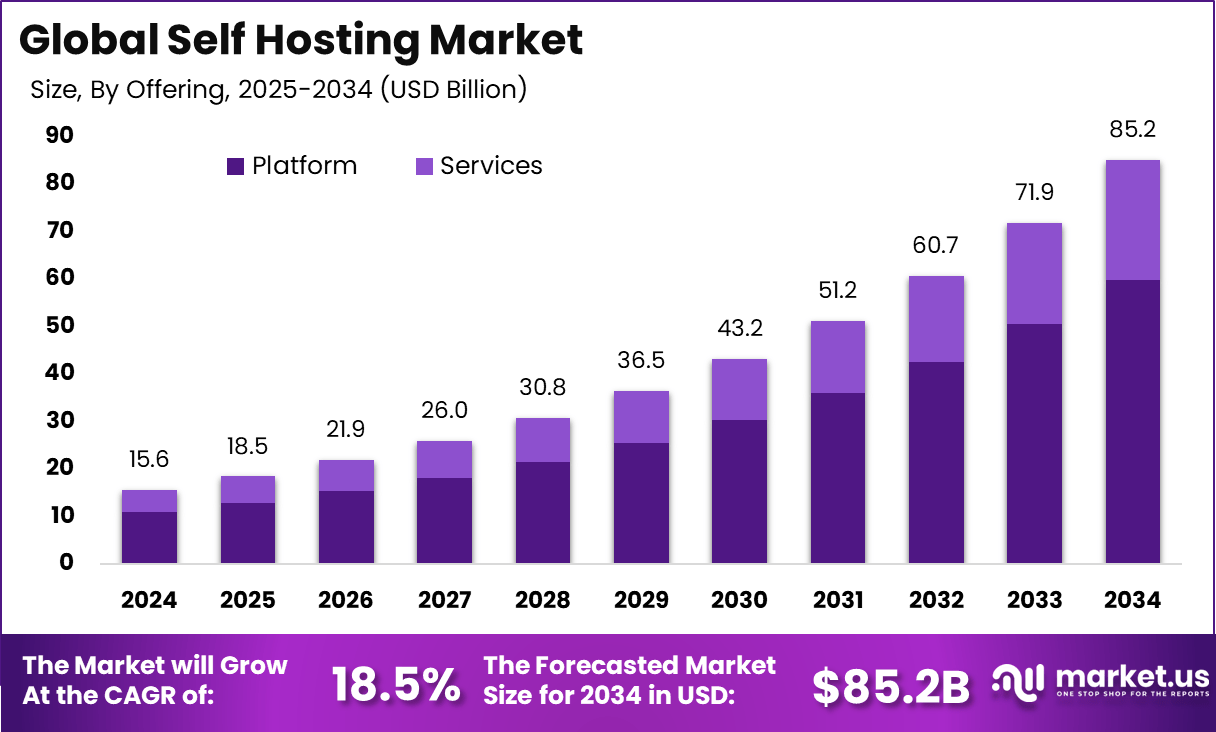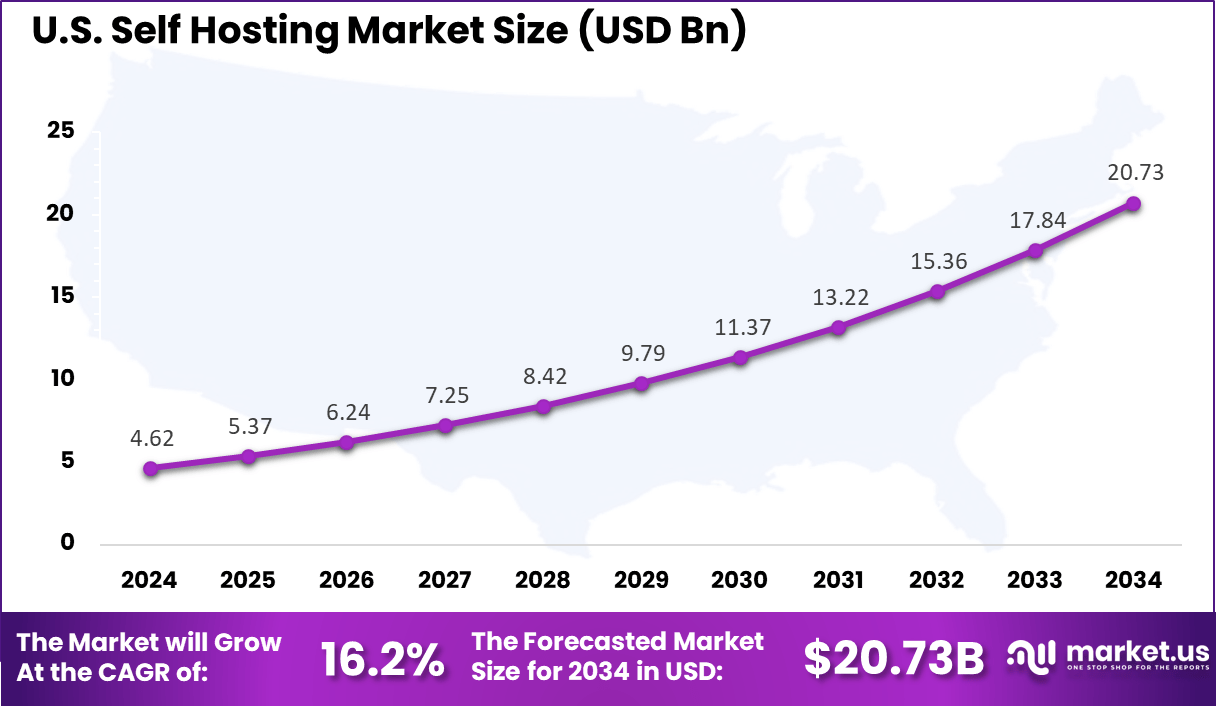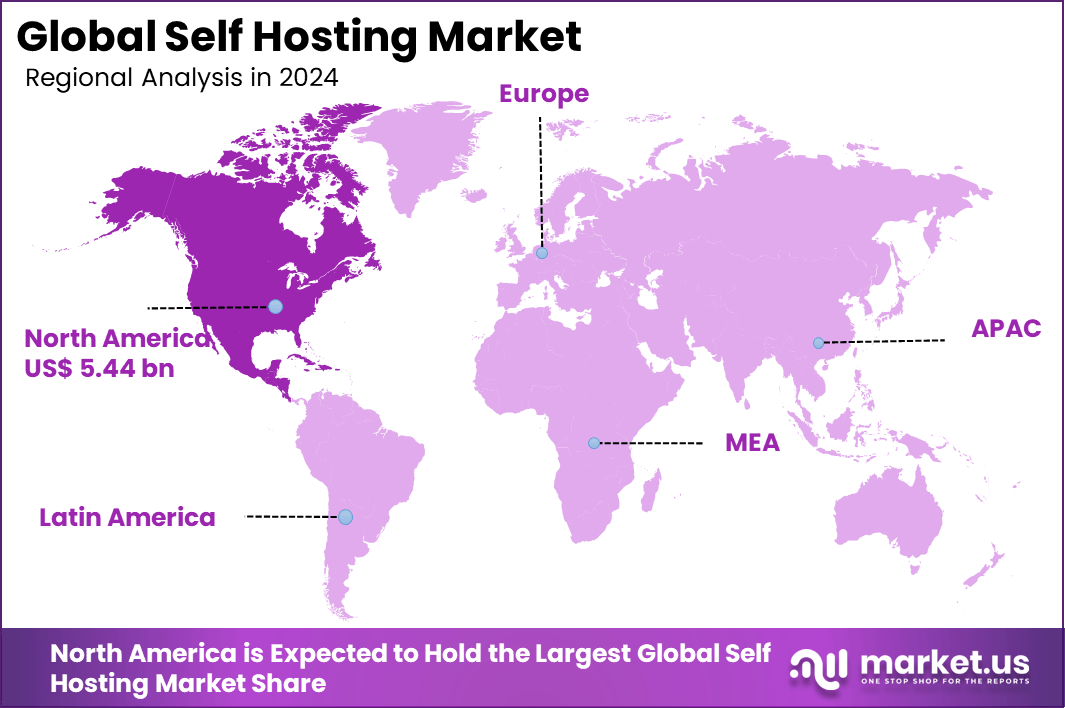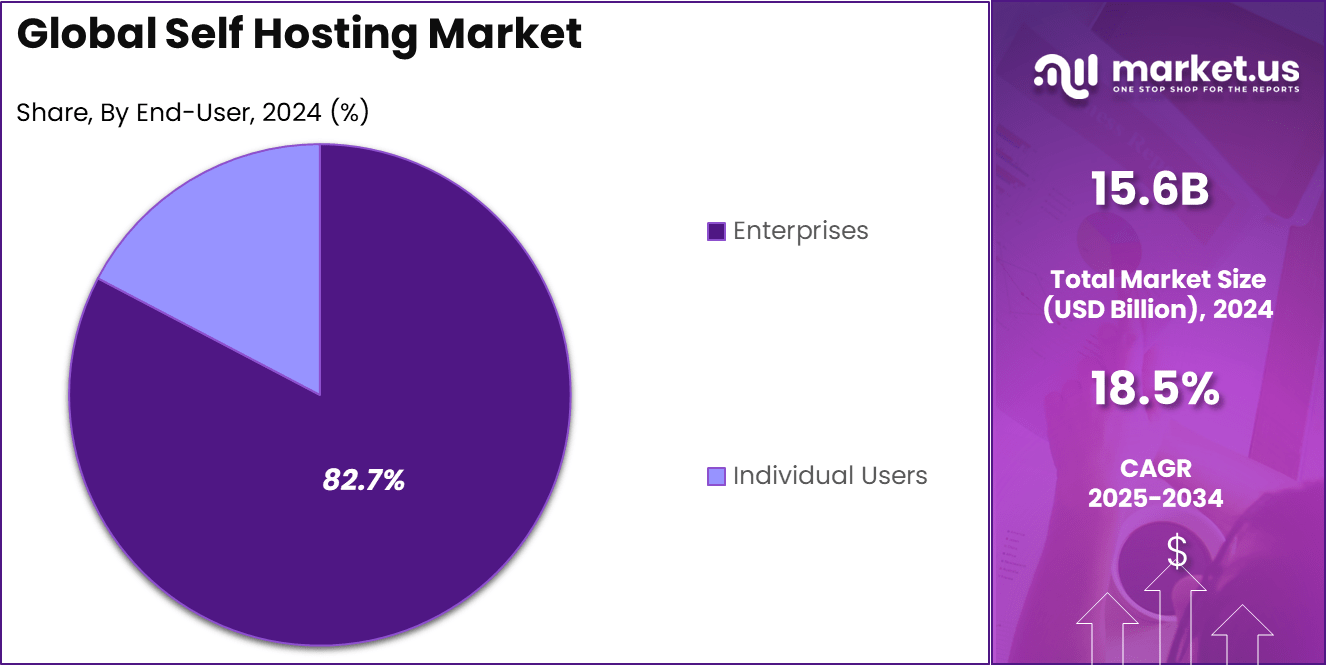Global Self Hosting Market Share, AI Impact Analysis Report By Offering (Platform, Services), By End-User (Individual Users, Enterprises), By Region and Companies - Industry Segment Outlook, Market Assessment, Competition Scenario, Trends and Forecast 2025-2034
- Published date: July 2025
- Report ID: 153546
- Number of Pages: 334
- Format:
-
keyboard_arrow_up
Quick Navigation
Report Overview
The Global Self Hosting Market size is expected to be worth around USD 85.2 billion by 2034, from USD 15.6 billion in 2024, growing at a CAGR of 18.5% during the forecast period from 2025 to 2034. In 2024, North America held a dominant market position, capturing more than a 34.9% share, holding USD 5.44 billion in revenue.

The self hosting market includes products, services, and ecosystems built around deploying, managing, and supporting privately controlled infrastructure for hosting websites, applications, databases, or other IT workloads. This market serves organizations across industries with heightened requirements for data security, compliance, or specific software customizations, as well as tech-savvy individuals who want more say in how their digital services operate.
Top Driving Factors include privacy regulations, open-source development, and rising cloud expenses. Governments and industry bodies are enforcing strict privacy standards, encouraging organizations to keep data in-house. Open-source communities have built high-quality alternatives for tools like analytics, project management, and storage. Businesses prefer self-hosted solutions to cut recurring costs from commercial hosting platforms.
For instance, in November 2024, Vercel updated Next.js to simplify self-hosting, allowing developers to easily deploy and manage applications on their infrastructure. These updates reduce setup complexity, giving businesses full control over customization and data security. This move reflects the growing trend of making self-hosting more accessible, addressing the rising demand for privacy and data sovereignty.
Key Takeaway
- The self-hosting market is witnessing steady expansion, projected to reach USD 85.2 billion by 2034, up from USD 15.6 billion in 2024, driven by rising concerns over data control, privacy, and operational flexibility.
- North America dominated with a 34.9% market share in 2024, generating USD 5.44 billion in revenue.
- The United States alone contributed USD 4.62 billion, supported by strong enterprise demand and a CAGR of 16.2%.
- Platform-based offerings led the market with a 70.3% share, as users favored comprehensive self-managed infrastructure stacks.
- The enterprise segment accounted for 82.7%, reflecting higher adoption among organizations seeking control over deployment, scalability, and security.
AI Impact
Artificial Intelligence is dramatically changing the world of self-hosting, giving businesses and individuals greater power to run their digital services on their own terms. As AI models have become lighter and more efficient, more organizations are now choosing to keep their AI systems on their own servers rather than depending solely on cloud platforms.
One key reason for self-hosting AI is data security. Companies in finance, healthcare, and government especially have strict rules about where data is stored and who can see it. Hosting AI models on-site makes it much easier to safeguard sensitive information and meet legal requirements. Some businesses point to fewer attack points, because fewer outside parties handle their data.
Compliance is another big driver. With tough privacy laws being enforced worldwide, managing everything in-house helps companies stay on the right side of the law. Cost is a growing concern as well. While cloud offerings are known for their flexibility, the price can jump up and down depending on use. Self-hosting offers steadier spending, especially if AI workloads are constant.
Customization is becoming more important for organizations that want their AI to do very specific jobs. Running everything locally makes it easier to fine-tune, change, or expand how AI works, which is sometimes impossible with generic cloud solutions. Performance is also a solid reason to keep AI close to the user. With self-hosting, there’s no lag from sending data to faraway data centers, so tasks get done faster – especially important for real-time work.
Analysts’ Viewpoint
The demand for self hosting continues to rise as digital awareness and technical skillsets improve across industries. Many businesses now see direct operational benefit in customizing hosting environments to enhance performance, improve integration, or enable niche applications. Unique requirements for healthcare, finance, legal, and research sectors keep demand strong because self hosting can fulfill standards that generic cloud platforms sometimes cannot meet.
The increase in self hosting adoption is propelled by technologies such as open-source software stacks, low-code platforms, and improved virtualization. Integrating artificial intelligence in self-hosted setups is becoming more common, allowing companies to experiment with advanced tools while maintaining better data privacy and compliance.
Self hosting presents attractive investment opportunities for those aiming to build specialized managed services, develop robust hardware, or create innovative management tools and security features. Startups focused on making self hosting simpler or more automated are well positioned to meet the surging demand, as are consultants skilled in compliance and deployment optimization.
U.S. Self Hosting Market Size
The market for Self Hosting within the U.S. is growing tremendously and is currently valued at USD 4.62 billion, the market has a projected CAGR of 16.2%. This market is expanding rapidly as businesses face rising concerns about data privacy, security risks, and the increasing costs of cloud services.
With regulations such as GDPR and CCPA in place, organizations are turning to self-hosting to have better control over their sensitive data. The growing adoption of decentralized systems and open-source solutions allows businesses to customize and secure their infrastructure. Additionally, the demand for flexible, cost-efficient solutions and a desire for greater independence from third-party providers are driving the market’s growth.
For instance, In January 2025, the U.S. strengthened its leadership in the self-hosting market with the launch of ChatGPT-Gov by OpenAI. This platform was tailored for government agencies, allowing them to host AI systems on their own servers. The move emphasized the country’s focus on data privacy, security, and operational autonomy, reinforcing its dominant role in secure AI deployment for public sector needs.

In 2024, North America held a dominant market position in the Global Self Hosting Market, capturing more than a 34.9% share, holding USD 5.44 billion in revenue. It held a dominant position due to its advanced technological infrastructure, high levels of digitalization, and strong emphasis on data privacy and security.
The region is home to a large number of tech-savvy businesses and developers who are increasingly adopting self-hosted solutions to have greater control over their data and reduce dependency on third-party providers. Additionally, stringent regulatory requirements like CCPA and GDPR, along with the growing trend toward customization and cost-effective solutions, have further fueled North America’s leadership in the self-hosting market.
For instance, in July 2025, North America continued to dominate the self-hosting market with the launch of GoodData’s AI-powered self-hosted analytics solution. This advancement reinforces the region’s leadership in providing powerful, private, and customizable analytics platforms. By integrating AI capabilities into self-hosted analytics, GoodData empowers businesses to maintain full control over their data while benefiting from cutting-edge technology.

Offering Analysis
As of 2024, platform-based solutions lead the self hosting market, accounting for an impressive 70.3% of the total market share. This dominance is largely due to the flexibility and control that platforms offer to organizations. Unlike SaaS, self-hosted platforms allow businesses to manage, customize, and secure their own infrastructure, aligning IT systems tightly with evolving operational and compliance needs.
This approach is especially attractive to sectors where data privacy and sovereignty are top priorities. Organizations often turn to platform-based self hosting to retain full ownership over sensitive data and reduce reliance on third-party vendors. Advanced features, faster deployment cycles, and integration capabilities have solidified the position of self-hosted platforms in this fast-growing market.
For Instance, in March 2025, GitLab introduced a self-hosted AI platform, marking a significant advancement in the self-hosting market. This new platform enables organizations to run AI models and manage machine learning workflows entirely within their infrastructure. By offering a self-hosted solution, GitLab allows businesses to retain full control over their data and models, ensuring better security and compliance.
End-User Analysis
The Enterprises represent the lion’s share in the self hosting market, holding a commanding 82.7% of the end-user segment. This trend is driven by large organizations’ need for custom-built solutions, enhanced control, and internal compliance standards. Enterprises are increasingly moving workloads from public clouds back to on-premise or private data centers to meet regulatory requirements and enforce stricter governance over critical business data.
Self-hosting empowers enterprises with the capability to tailor IT environments for security, scalability, and performance. Especially in highly regulated industries – such as financial services, healthcare, and government – enterprise IT teams prefer maintaining infrastructure in-house to mitigate data leakage risks and support unique business processes. The combination of scalable orchestration, in-house expertise, and the demand for digital sovereignty keeps enterprise adoption ahead of other segments.
For instance, in July 2025, Coder unveiled its enterprise-grade platform for self-hosted AI development environments, offering businesses a robust solution to build and manage AI models securely within their infrastructure. This platform enables enterprises to maintain full control over their AI development processes, ensuring compliance with privacy standards and enhancing data security.

Key Market Segments
By Offering
- Platform
- Cloud Based
- On-Premises
- Services
- Implementation & Integration Services
- Consulting & Training Services
By End-User
- Individual Users
- Enterprises
- BFSI
- Healthcare
- Government
- IT & Telecom
- Others
Key Regions and Countries
- North America
- US
- Canada
- Europe
- Germany
- France
- The UK
- Spain
- Italy
- Russia
- Netherlands
- Rest of Europe
- Asia Pacific
- China
- Japan
- South Korea
- India
- Australia
- Singapore
- Thailand
- Vietnam
- Rest of Latin America
- Latin America
- Brazil
- Mexico
- Rest of Latin America
- Middle East & Africa
- South Africa
- Saudi Arabia
- UAE
- Rest of MEA
Emerging Trend
Integration of AI and Automation in Self-Hosting
A noticeable trend in self-hosting for 2025 is the rapid adoption of artificial intelligence and automation within hosting management tools. Users are increasingly leveraging smart systems to handle server maintenance, security updates, and traffic optimization.
With AI-powered features, even those with limited technical expertise can benefit from predictive maintenance and instant threat detection, which streamlines managing their own apps and websites. This development is transforming self-hosting into a more accessible and resilient choice, enabling private individuals and smaller businesses to achieve what used to require experienced IT teams.
Drivers
Customization and Control
Self-hosting provides businesses with complete control over their infrastructure and software, enabling them to fully tailor solutions to meet specific operational needs. This level of flexibility is especially appealing to tech-savvy enterprises and developers who require customized applications, advanced configurations, and integration capabilities.
By self-hosting, businesses can fine-tune their systems, optimize performance, and implement unique features that align precisely with their objectives, avoiding the limitations of third-party cloud services. This autonomy makes self-hosting an ideal choice for organizations with specific technical requirements and expertise.
For instance, in June 2025, Doubleword launched its self-hosted inference platform on the Snowflake Marketplace, expanding the availability of secure and customizable AI-driven solutions for businesses. This new platform allows organizations to run inference models in a self-hosted environment, ensuring enhanced control over data security and compliance with privacy regulations.
Restraint
Limited Support and Vendor Ecosystems
Unlike cloud solutions that come with comprehensive vendor support and expansive ecosystems, self-hosted systems often face challenges in accessing immediate assistance and troubleshooting. The lack of external vendor support means businesses must rely on internal resources for issue resolution, which can lead to delays in restoring services or implementing critical updates.
Moreover, the absence of a robust ecosystem around self-hosted solutions can limit integration with other third-party applications, potentially complicating workflows and increasing operational overhead, particularly for smaller organizations with limited IT expertise.
Opportunities
Growth in Privacy-Conscious Markets
Self-hosted solutions are increasingly appealing to industries with strict regulatory and privacy requirements, such as healthcare, finance, and legal sectors. These industries often handle sensitive data and are subject to complex regulations like GDPR, HIPAA, and financial compliance laws.
Self-hosting allows organizations to maintain full control over their data, ensuring compliance while safeguarding against third-party breaches or misuse. As concerns over data privacy intensify, businesses in these sectors are likely to embrace self-hosting as a secure and compliant alternative to cloud-based solutions, expanding the market for self-hosted technologies.
For instance, In February 2025, Decentro launched India’s first self-hosted CKYC solution to help firms meet CERSAI’s compliance rules. It allows financial institutions to verify customer identities while keeping full control over sensitive data. This move shows growing demand for self-hosted tools in markets where privacy and regulation are key concerns.
Challenges
Keeping Up with Updates and Compatibility
Self-hosting demands ongoing software updates, patches, and compatibility management, which can be time-consuming and resource-intensive. Unlike cloud providers that handle these tasks automatically, businesses must invest in dedicated IT resources to ensure their systems remain up-to-date and secure.
Additionally, ensuring compatibility with new technologies, applications, and standards requires continuous monitoring and adjustments, which can divert focus from core business operations. For organizations without sufficient technical expertise, managing these complexities can become a significant challenge, potentially affecting system performance and security.
For instance, In May 2025, the Shiba Inu project’s Shibarium platform transitioned to self-hosted nodes to boost decentralization and control. This move provides more autonomy and security but also brings challenges like regular updates and system compatibility. The team must now ensure timely security patches and maintain alignment with the wider blockchain ecosystem.
Key Players Analysis
The self-hosting market is shaped by a diverse range of solution providers addressing the increasing need for data control and privacy. Nextcloud GmbH and Supabase Inc. have gained attention for their open-source platforms that enable businesses and individuals to host collaboration and backend tools on their own servers. These platforms are especially valued for reducing reliance on public cloud services.
Other contributors such as Verpex Limited, GoDaddy Operating Company, LLC, and InMotion Hosting, Inc. are strengthening the commercial self-hosted infrastructure segment. These companies offer robust hosting packages tailored to professionals, developers, and SMBs seeking reliability and support. Their platforms often include easy control panels, domain management, and flexible server configurations.
Meanwhile, players like Cedar Software Technologies, Cloudron, and Bitwarden, Inc. are carving their niche by offering modular or container-based platforms. Bitwarden’s self-hosted password manager and Cloudron’s app management stack are increasingly used by DevOps teams. Additionally, ImageKit Private Limited and StarCompliance are enabling hosted visual optimization and compliance management, respectively, within private networks.
Top Key Players in the Market
- Nextcloud GmbH
- Supabase Inc.
- Verpex Limited.
- GoDaddy Operating Company, LLC
- InMotion Hosting, Inc.
- Cedar Software Technologies
- Cloudron
- Bitwarden, Inc.
- ImageKit Private Limited
- StarCompliance
- Others
Recent Developments
- Early in 2024, FUTO, a privacy-first technology organization, acquired Immich – a popular self-hosted alternative to Google Photos. This strategic move introduced new licensing options starting July 2024, where users could pay $25 (personal) or $100 (server) for a ‘Licensed’ badge.
- Verpex has scaled globally at an impressive rate, now hosting more than 250,000 websites across 181 countries (July 2024). The company’s focus has been on robust support with a 99.95% case resolution rate and constant infrastructure upgrades.
Report Scope
Report Features Description Base Year for Estimation 2024 Historic Period 2020-2023 Forecast Period 2025-2034 Report Coverage Revenue forecast, AI impact on market trends, Share Insights, Company ranking, competitive landscape, Recent Developments, Market Dynamics and Emerging Trends Segments Covered By Offering (Platform, Services), By End-User (Individual Users, Enterprises) Regional Analysis North America – US, Canada; Europe – Germany, France, The UK, Spain, Italy, Russia, Netherlands, Rest of Europe; Asia Pacific – China, Japan, South Korea, India, New Zealand, Singapore, Thailand, Vietnam, Rest of Latin America; Latin America – Brazil, Mexico, Rest of Latin America; Middle East & Africa – South Africa, Saudi Arabia, UAE, Rest of MEA Competitive Landscape Nextcloud GmbH, Supabase Inc., Verpex Limited., GoDaddy Operating Company, LLC, InMotion Hosting, Inc., Cedar Software Technologies, Cloudron, Bitwarden, Inc., ImageKit Private Limited, StarCompliance, Others Customization Scope Customization for segments, region/country-level will be provided. Moreover, additional customization can be done based on the requirements. Purchase Options We have three license to opt for: Single User License, Multi-User License (Up to 5 Users), Corporate Use License (Unlimited User and Printable PDF) 
-
-













